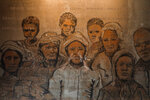AFRICATOWN — Say their names; 110 in all. They are the men, women and children who were kidnapped from their west African homes and dragged across the Atlantic, the last to arrive on American …
This item is available in full to subscribers.
Please log in to continue |





AFRICATOWN — Say their names; 110 in all.
They are the men, women and children who were kidnapped from their west African homes and dragged across the Atlantic, the last to arrive on American soil in a trade that had been outlawed more than 50 years prior to their journey.
Now, their descendants, their grandchildren, some only three and four generations removed from that wicked history, want the world to remember their struggle and celebrate their strength.
Africatown Heritage House and "Clotilda: The Exhibition" opened Friday, July 7, in the Africatown community, which is about three miles north of downtown Mobile and was founded by Clotilda survivors after they were freed from slavery following the Civil War.
The museum opened its doors 163 years to the day after the ship arrived in the dark marshy waters outside Mobile. The schooner's hull had been built to ferry lumber, cotton and food, but this night served instead as a cage as each person was chained and had less than five square feet of space. They were stripped naked before they boarded. They slept, ate and used the bathroom in the same spot for 45 days. Historians think several died on the way.
To hide his crime, its captain, William Foster, burned the ship in 20 feet of water. What didn't burn sank. But the hull remained largely intact, giving historians today proof that the wooden shipwreck that locals called the worst-hidden secret in Mobile was exactly what they all knew in their hearts to be: the last known ship to bring enslaved people from Africa to the United States.
Now, with the opening of the $1.3 million Africantown Heritage House, those who were kidnapped, starved, beaten, torn from their families and enslaved have a voice.
Inside the 2,500-square-foot-exhibit, visitors can hear voice recordings from survivors as they recall their lives in Africa. There is the retelling of the creation of Africatown where education and religion became the touchstones survivors looked to in order to build a better future for their families.
There is, in every voice, hope for a better tomorrow.